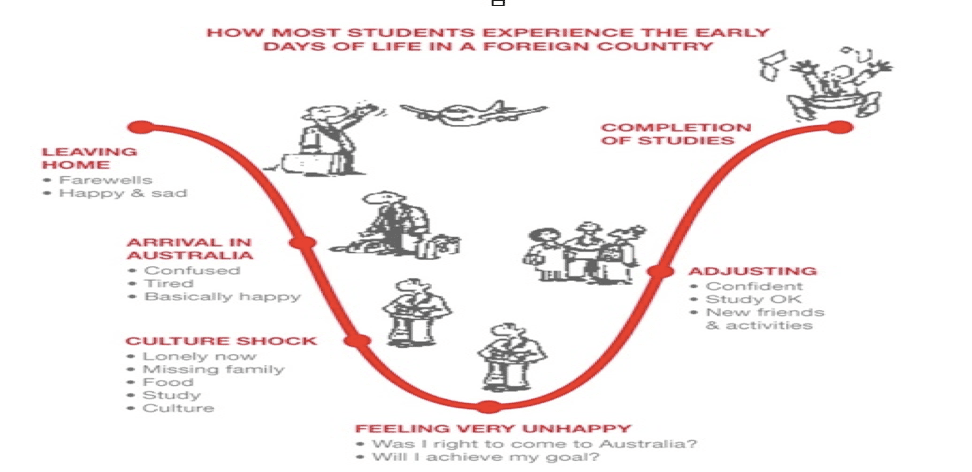We all feel like strangers at first. By understanding yourself, you can make huge progress in adjusting. Resources including Best Practices and Coaching Videos are readily available for clients.
You’ve probably already hit some unexpected roadblocks. Cultural transitions can be confusing and emotionally disorienting — to the point you don’t know what is hitting you. Rest assured you are not alone. Most of us living in other cultures feel your pain. In fact, it is reassuring to know there are models which indicate what a lot of people experience. When you look at time across the bottom of the U-curve, you can see yourself somewhere along the satisfaction timeline? Are you OK? Or, are you in a down-stage where everything looks pretty bad? Thinking about quitting and going home? The good news is that you can come through these low points and start to feel a lot better — just give it time and understand what is happening.

(Adapted from Bremner, 2013)
What If I Need Down Time?
It may help to remember your GCA score on openness which addresses your willingness to learn new ideas and consider new values. Obviously, it is unproductive to completely turn away from people or new situations. And, too, you want to avoid speaking in ways that appear rigid, dogmatic, and closed. The idea is to consider alternatives and new points of view. Openness is influenced by many factors including: disagreement skills, alternative dispute skills, group or cultural diversity, previous experiences with disagreement or conflict, or opportunity to learn these skills.
Best Practices
- Discover cultural rules regarding when to be open and when to be guarded
- Learn flexibility appropriate for the culture
- Ensure nonverbal actions match each verbal statements, such as how you use your body, eye contact, voice, stance, and personal space
- Avoid nonverbal behaviors that seem cold, indifferent, or aloof
- Ask questions when you encounter new concepts, slang, and language habits that your host-culture friends and colleagues seem to use
- Keep trying new foods, exploring new places, and as always, try to reach out to people around you
What If I Don’t Want Inclusion?
In this case go back to the GCA Report and remember that your social inclusion score tells you what you might feel when meeting people with different beliefs, looks, clothing, technical knowledge, or education. Remember that a low score can reflect ethnocentrism (my culture is better than others) or negative stereotypes. So, rather than avoiding meeting strangers, engage others regardless of perceived differences. Through systematic desensitization you will begin to find these interactions bearable and eventually enjoyable.
What if I Hate Change?
As a starting place, the GCA Report on managing change refers to encountering diverse ideas, new logic, or different processes. It also measures the change or risk levels with which you are comfortable (recall that 84% is average). You want to deal with your feelings and try out actions that are comfortable and safe, which may imply checking your attitudes and working toward exposure of new and creative ways things are done. We’ve all been in new cultures where we simply didn’t understand why natives did things a certain way, or why things happen at certain times, or why they talk about things a certain way. Your evaluations may result from previous mindsets or perhaps technical exposure to new ideas and products. Thus, the best goal is to encourage your own enthusiasm. Keep in mind, too, that you may be going through one of the culture shock stages, so what you are experiencing is not the real you or what you want to be in this situation. We recommend listening, trying, asking, and not giving up.
Best Practices
- Create simplified opportunities to trust before sharing complicated tasks
- Remember times you dealt successfully with previous risk and innovation
- Identify how you have dealt with past challenges; why is this different?
- Try innovations by stages; otherwise, you could feel overwhelmed
- Revisit strategies for encountering cultures: interpersonal skills, nonverbal cues, cultural knowledge, and cultural values
- Identify benefits of this cultural experience
- Identify what you learned from previous travel
- List travel experiences you would pass on as if you were your own coach

